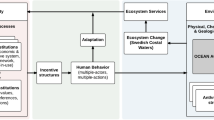Abstract
The oceans moderate the rate and severity of climate change by absorbing massive amounts of anthropogenic CO2 but this results in large-scale changes in seawater chemistry, which are collectively referred to as anthropogenic ocean acidification. Despite its potentially widespread consequences, the problem of ocean acidification has been largely absent from most policy discussions of CO2 emissions, both because the science is relatively new and because the research community has yet to deliver a clear message to decision makers regarding its impacts. Here we report the results of the first expert survey in the field of ocean acidification. Fifty-three experts, who had previously participated in an IPCC workshop, were asked to assess 22 declarative statements about ocean acidification and its consequences. We find a relatively strong consensus on most issues related to past, present and future chemical aspects of ocean acidification: non-anthropogenic ocean acidification events have occurred in the geological past, anthropogenic CO2 emissions are the main (but not the only) mechanism generating the current ocean acidification event, and anthropogenic ocean acidification that has occurred due to historical fossil fuel emissions will be felt for centuries. Experts generally agreed that there will be impacts on biological and ecological processes and biogeochemical feedbacks but levels of agreement were lower, with more variability across responses. Levels of agreement were higher for statements regarding calcification, primary production and nitrogen fixation than for those about impacts on foodwebs. The levels of agreement for statements pertaining to socio-economic impacts, such as impacts on food security, and to more normative policy issues, were relatively low.

Similar content being viewed by others
References
Andersson AJ, Mackenzie FT, Gattuso J-P (2011) Effects of ocean acidification on benthic processes, organisms, and ecosystems. In: Gattuso J-P, Hansson L (eds) Ocean acidification. Oxford University Press, Oxford, pp 122–153
Denman KL, Brasseur G, Chidthaisong A et al (2007) Couplings between changes in the climate system and biogeochemistry. In: Solomon S, Qin D, Manning M et al (eds) Climate change 2007: the physical science basis. Contribution of working group I to the fourth assessment report of the Intergovernmental Panel on Climate Change. Cambridge University Press, Cambridge
Doney SC, Mahowald N, Lima I et al (2007) Impact of anthropogenic atmospheric nitrogen and sulfur deposition on ocean acidification and the inorganic carbon system. Proc Nat Acad Sci USA 104:14580–14585
Doney SC, Fabry VJ, Feely RA, Kleypas JA (2009) Ocean acidification: the other CO2 problem. Ann Rev Mar Sci 1:169–192
Gattuso J-P, Hansson L (eds) (2011) Ocean acidification. Oxford University Press, Oxford
Gattuso J-P, Riebesell U (2011) Reconciling apparently contradictory observations. In: Field CB, Barros V, Stocker TF et al (eds) Workshop report of the Intergovernmental Panel on Climate Change workshop on impacts of ocean acidification on marine biology and ecosystems. IPCC Working Group II Technical Support Unit, Carnegie Institution, Stanford, California, pp 10–16
Gattuso J-P, Allemand D, Frankignoulle M (1999) Photosynthesis and calcification at cellular, organismal and community levels in coral reefs: a review on interactions and control by carbonate chemistry. Am Zool 39:160–183
Gattuso J-P, Bijma J, Gehlen M, Riebesell U, Turley C (2011) Ocean acidification: knowns, unknowns and perspectives. In: Gattuso J-P, Hansson L (eds) Ocean acidification. Oxford University Press, Oxford, pp 291–311
Harrould-Kolieb ER, Herr D (2011) Ocean acidification and climate change: synergies and challenges of addressing both under the UNFCCC. Clim Pol 1–12
Hendriks IE, Duarte CM, Alvarez M (2010) Vulnerability of marine biodiversity to ocean acidification: a meta-analysis. Estu Coastal Shelf Sci 86:157–164
Kroeker K, Kordas RL, Crim RN, Singh GG (2010) Meta-analysis reveals negative yet variable effects of ocean acidification on marine organisms. Ecol Lett 13:1419–1434
Le Quéré C, Raupach MR, Canadell JG et al (2009) Trends in the sources and sinks of carbon dioxide. Nat Geosci 2:831–836
Lee PM (2004) Bayesian statistics: an introduction, 3rd edn. Wiley, New York
Liu J, Weinbauer MG, Maier C, Dai M, Gattuso J-P (2010) Effect of ocean acidification on microbial diversity, and on microbe-driven biogeochemistry and ecosystem functioning. Aquat Microb Ecol 61:291–305
Mastrandrea MD, Field CB, Stocker TF et al (2010) Guidance note for lead authors of the IPCC fifth assessment report on consistent treatment of uncertainties. Intergovernmental Panel on Climate Change (IPCC)
Riebesell U, Tortell PD (2011) Effects of ocean acidification on pelagic organisms and ecosystems. In: Gattuso J-P, Hansson L (eds) Ocean acidification. Oxford University Press, Oxford, pp 99–121
Rockström J, Steffen W, Noone K, Persson Ă, Chapin FS, Lambin E, Lenton TM, Scheffer M, Folke C, Schellnhuber HJ, Nykvist B, de Wit CA, Hughes T, van der Leeuw S, Rodhe H, Sörlin S, Snyder PK, Costanza R, Svedin U, Falkenmark M, Karlberg L, Corell RW, Fabry VJ, Hansen J, Walker B, Liverman D, Richardson K, Crutzen P, Foley J (2009) Planetary boundaries: exploring the safe operating space for humanity. Ecol Soc 14: ART 32.
Sabine CL, Feely RA, Gruber N et al (2004) The oceanic sink for anthropogenic CO2. Science 305:367–371
Schubert R, Schellnhuber H-J, Buchmann N, Epiney A, Grießhammer R, Kulessa M, Messner D, Rahmstorf S, Schmid J (2006) The future of oceans- Warming up, rising high, turning sour. 110. German Advisory Council on Global Change, Berlin
Acknowledgements
We thank the respondents for their participation in the study (for full list see the supplementary information). Discussions with Michael Mastrandrea were instrumental in designing the survey. The assistance of Mandy B. Holbrook, Avani Kaushik and Tatiana Donnay is gratefully acknowledged. This work is a contribution to the “European Project on Ocean Acidification” and to the MedSeA project. Work at Carnegie Mellon was supported by the Center for Climate and Energy Decision Making (through a cooperative agreement between the National Science Foundation and Carnegie Mellon University (SES-0949710)).
Author information
Authors and Affiliations
Corresponding author
Electronic supplementary material
Below is the link to the electronic supplementary material.
ESM 1
(PDF 1050 kb)
Rights and permissions
About this article
Cite this article
Gattuso, JP., Mach, K.J. & Morgan, G. Ocean acidification and its impacts: an expert survey. Climatic Change 117, 725–738 (2013). https://doi.org/10.1007/s10584-012-0591-5
Received:
Accepted:
Published:
Issue Date:
DOI: https://doi.org/10.1007/s10584-012-0591-5




